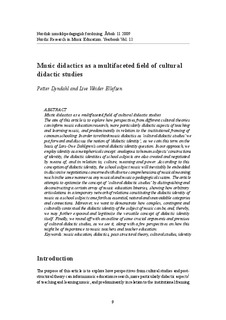Music didactics as a multifaceted field of cultural didactic studies
Chapter
Permanent lenke
http://hdl.handle.net/11250/134330Utgivelsesdato
2009Metadata
Vis full innførselSamlinger
Originalversjon
Dyndahl, P. & Ellefsen, L. W. (2009). Music didactics as a multifaceted field of cultural didactic studies. I F. V. Nielsen, S.-E. Holgersen & S. Graabræk Nielsen (Red.), Nordisk musikkpedagogisk forskning: Årbok 11 2009 (s. 9-32). Oslo: Norges musikkhøgskole.Sammendrag
The purpose of this article is to explore how perspectives from cultural studies and post-structural theory can inform music education research, more particularly didactic aspects of teaching and learning music, and predominantly in relation to the institutional framing of common schooling. In order to rethink music didactics as `cultural didactic studies´ we put forward and discuss the notion of `didactic identity´, as we coin this term on the basis of Dahlgren´s (1989) central didactic identity question. In our approach, we employ identity as a metaphorical concept: analogous to human subjects´ constructions of identity, the didactic identities of school subjects are also created and negotiated by means of, and in relation to, culture, meaning and power. According to this conception of didactic identity, the school subject music will inevitably be embedded in discursive negotiations concerned with diverse comprehensions of musical meaning, much in the same manner as any musical and musico-pedagogical custom. The article attempts to epitomize the concept of `cultural didactic studies´ by distinguishing and deconstructing a certain array of music education binaries, showing how arbitrary articulations in a temporary network of relations constituting the didactic identity of music as a school subject come forth as essential, natural and unavoidable categories and connections. Moreover, we want to demonstrate how complex, contingent and culturally contextual the didactic identity of the subject music can be, and, thereby, we may further expound and legitimize the versatile concept of didactic identity itself. Finally, we round off with an outline of some crucial arguments and premises of cultural didactic studies, as we see it, along with a few perspectives on how this might be of importance to music teachers and teacher education.
